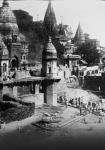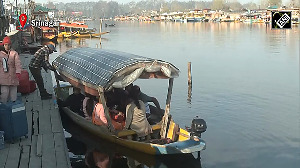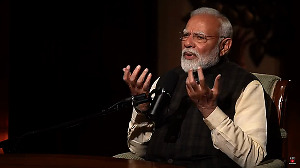The first stage of the public hearings concluded on October 13, 2006 and this report is based on those hearings.
"What we have heard has been valuable to the Commission and to the country," Major said. "It has promoted a better understanding of the tragedy experienced by the families and those who worked to recover the bodies lost in the bombing. The Commissioner is, of course, aware that while we now have a better understanding, only those persons who lived and continue to live the tragedy and its aftermath can truly feel the impact of this act of terrorism."
In this report, Justice Major pays tribute to the victims through vignettes of their lives, often with accompanying photos:
This part of the report is titled 'The Human Loss: Unfulfilled Potential'.
There are stories of how Shakuntala, Uma, Sandhya and Swati Sharma happened to be on the ill-fated Air India Flight 182: "Such a devastating loss has been difficult for the family, several of whom appeared before the Commission or submitted photos or written statements,' the report says. "In one callous act, a massacre had wiped out three generations of accomplished and promising women. Their laughter would be heard no more, their potential snuffed out by the treachery of unseen assassins.'
There's the story of Chandra and Manju Khandelwal and of Basra Kelly. There's also the tale of how Nagasundara Radhjkrishna decided to travel to India with her two children Jyothi and Thejus.
Jyothi was 14 and the report contains what she herself wrote in her school journal on June 7, 1985, 16 days before she lost her life:
"Let the time before ripe, let us wait
Let things become all right
Let there be no bloodshed or war
Let feelings of happiness prevail, not ones to sore
Let the answers be peace, let the fighting cease
Then we shall live happily forever."
The report praised those who have been vocal advocates for the families all these years including Lata Pata, who lost her husband Vishnu and two daughters, as well as Dr Bal Gupta, a Ontario engineer, who lost his wife Ramwati.
Gupta, in fact, has provided leadership to the victims' families all these years. He has been waging a war with the federal law enforcement agencies and others, demanding a public inquiry that was finally instituted last year.
Now his son, Susheel Gupta, who was 12 at the time of the Air India tragedy, is an attorney working for the Federal Justice Department. He has also been vocal and active on behalf of the victims' families:
The report quotes what Susheel said in his testimony before Justice Major: "I promised myself and my mother that I was going to work in a field where I could make my country, Canada, safer, healthier and happier, and that decision turned into my decision to be a lawyer, for I personally believe it speaks to the fact that I hold great respect for the Department of Justice and our government institutions, even being a victim of terrorism, where there have really been no convictions '
In section V titled 'Reconciliation and Hope', the report details how the victims' families rallied around in search of justice: "They felt ignored and had a sense of isolation and hopelessness. In India, other families felt more distanced from the entire matter. Some individuals, well-meaning but without adequate legal or monetary assistance, assumed the challenge of organising, lobbying for and representing the interests of groups of surviving families.'
Kalwant Mamk lost his wife Rajinder who was going to India to visit her ailing father. After the tragedy, he traveled to India to learn how to cook. "Today, he volunteers his services to cook for charitable and fundraising events. His mission is to help others wherever the opportunity arises."
The report also contains stories and agonizing experiences of Irish rescuer Daniel Brown, who was on the Laurentian Forest, the only merchant ship in the area that launched a lifeboat to rescue victims from the freezing waters of the Atlantic:
' as we came under the stern, I had to go over and lie on top of the bodies to keep my head below the gunwale,' testified Brown before Justice Major. "The boat continued to come under the stern and the first time it hit, it was quite light really, but as we kept coming under the stern, we had more and more increasing impact and I thought the boat was going to break up.'
Brown was joined by Captain Roddy McDougall. The report details the problems they faced while rescuing the bodies of the victims: 'The major problem was how to put the bodies onto the ship. Some crew members were becoming ill and others were crying at the carnage Their (rescuers) challenges continued to mount '
As he later watched the arrival of the victims' families on the television news he "just went back to the ship and the cabin and just cried.'
Later, Brown testified that he was "having a lot of trouble sleeping, as he kept on having nightmares and flashbacks. I became aggressive, cynical and angry."
While the families have been quoted in the media for years, "What was different this time was that the families were invited by this Commission, mandated by the government of Canada to express their feelings in a formal hearing before a government-appointed Commissioner,' said Justice Major.
The public hearings are likely to conclude this Friday. So far, it has not been revealed when Justice Major would be able to submit his final report. It is likely to be submitted in the second half of next year.
The report will largely contain recommendations about the functioning of Canada's law enforcement agencies, how Canada can ensure that foreign money is not injected into this country for terrorist activities, and how the government should ensure that those who have inside information about terrorism, are safeguarded so that they could testify in the courts against perpetrators of acts of terrorism.
However, Justice Major has no authority to revisit the cases of Ripudman Singh Malik and Ajaib Singh Bagri, the accused in the Air India tragedy who were freed by the British Columbia Supreme Court.
Image: Counsel for the families of the victims, Jacques Shore, reviewing the first report of the Air India Commission with Mahesh Sharma and Commission registrar Gilles Brisson. Sharma, who has attended many of the Commission's
public hearings, lost his wife, two daughters and mother-in-law when Air India Flight 182 exploded off the coast of Ireland on Juen 23, 1985.
Photograph, courtesy: Air India Commission of Inquiry






 © 2025
© 2025